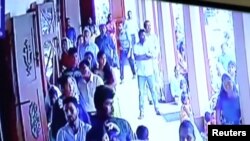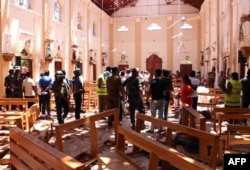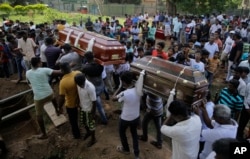Sri Lankan Prime Minister Ranil Wickremesinghe said the suicide bombings that devastated the country on Easter Sunday could have links to Islamic State, which has claimed responsibility.
Another official indicated that the bombings were in retaliation for last month’s attacks on mosques in New Zealand. On Tuesday, Sri Lanka observed a national day of mourning as the death toll climbed to 321.
The explosions ripped through four hotels and three prominent churches, targeting tourists and Christian worshippers.
“We will be following up on IS claims. We believe there may be links,” Wickremesinghe said at a press conference.
Amid scenes of intense grieving and reciting of prayers, the first mass funeral took place at St. Sebastian’s Church in the city of Negombo, which suffered the worst devastation.
Coffins of the young and old were lowered into graves, as white flags fluttered and armed soldiers guarded a compound packed with those who had lost loved ones. More than 100 Easter Sunday worshippers, including children, died at the popular shrine.
People throughout the country lowered heads and observed three minutes of silence at 8.30 a.m. local time — marking the time that the first blast rocked the country. Flags on government buildings were flown at half-staff, and mourners held candles outside another church that was targeted in the capital, Colombo.
Forty people, all Sri Lankans, have been arrested so far in connection to the attacks. The police and military were given sweeping powers of search and detention under emergency laws. A nighttime curfew continues.
“The initial investigation has revealed that this attack was in retaliation for the New Zealand mosque attack,” junior Defense Minister Ruwan Wijewardene told parliament on Tuesday. Fifty people were killed at two mosques on March 15 in Christchurch by an Australian gunman. The minister gave no details about why the link had been made.
As the Sri Lankan government faces questions about a massive security failure in preventing the bombings, Wickremesinghe confirmed that there was specific intelligence about the attacks from India.
Reports say Indian intelligence agencies sent out several warnings to Sri Lanka, and that Indian security agencies had gathered details about Islamic militant group National Thowfeek Jamaath (NTJ), which is suspected of carrying out the attacks.
The government also faces scrutiny on whether bitter political wrangling between President Maithripala Sirisena andWickremesinghe contributed to the failure to act upon warnings about the attacks. Wickremesinghe said that there had been a “breakdown in communication.”
But Wickremesinghe said differences with Sirisena have been resolved.
“We have a difference in opinion, but it has been thrashed out. And somehow, we have to get the country out of the problem,” he said.
In the aftermath of the attacks, several officials have pointed out that the prime minister was blocked out of security meetings by the president, who holds the defense portfolio.
Asked if there are currently active threats in the country,Wickremesinghe said there are "still people on the run with explosives."
Meanwhile, questions continue about how the NTJ could have conducted an operation of the sophistication and magnitude involved in the serial blasts.
“This is the first time we have seen a group come out from virtually nowhere and execute a terrorist blast on this scale,” said Ajai Sahni of the Institute of Conflict Management in New Delhi. “We had never heard of them before this incident. I had come across one reference to them in 2018.”
The group was primarily associated with a few videos of hate speech and the defacing of Buddhist statues.
Muslims make up about 10% of Sri Lanka’s Buddhist-majority population. Islamist militancy had not posed any threat, although there had been animosity and clashes between hard-line Sinhala Buddhists and Muslims.
The country's Christian community, which was among the major targets of the attacks, has not faced any significant violence, either.
Wickremesinghe said Sri Lanka, which was wracked by an ethnic separatist insurgency for two decades, does not face major religious tensions.
“The government will continue its policy of having unity in the country and of having religious groups getting together, while cracking down on global terrorism,” he said.

















